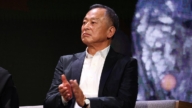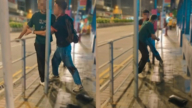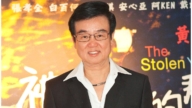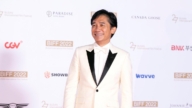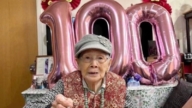【新唐人2012年6月22日訊】湖南維權人士李旺陽離奇死亡,不少香港報章大篇幅報導,但有百年以上歷史的英文報紙《南華早報》則在第二天只以簡訊處理,惹起業界和員工質疑,但當員工查問總編輯時,對方僅表示這是他的決定,並回覆帶有恐嚇性的文字。事件惹來各界的關注,業內人士要求作出解釋。
這個月6號,李旺陽被發現在醫院窗戶上離奇吊頸死亡,香港媒體在第二天普遍大幅報導,而《南華早報》只在A6內版刊登了一篇一百多字的簡訊。
《南華早報》已有109年歷史,是香港主要的英文收費報紙。
香港媒體披露,李旺陽離奇死亡當天,《南華早報》首版印刷的相關事件報導有六百多字,與零售版的一百多字簡訊報導有相當大的差異。而刪減後的簡訊是由報社總編王向偉親自拍板。
6月7號晚上,《南華早報》的一名外籍兼職編輯普萊斯(Alex Price)寫電郵給王向偉,認為這樣做是自我審查。但王向偉在電郵中回覆說:「是我做出的決定……如果你不滿意,你應該知道怎麼做。」
普萊斯認為王向偉的回覆具有恐嚇性。
普萊斯表示,當其他媒體以大篇幅報導事件,向總編輯提出如此質疑實屬合理,他認為,這樣處理令新聞操守和《南華早報》的公信力岌岌可危,因此王總編輯欠員工和讀者一個解釋。
到目前為止,王向偉沒有公開解釋為甚麼要把李旺陽的報導縮減成簡訊,不過他否認這樣做是「自我審查」。
王向偉今年2月從報社副總編職位被晉升為總編。他16年前加入《南華早報》,曾任職《中國日報》,目前還擔任中國吉林省政協委員。
香港媒體人程翔指出,隨著有中共背景的媒體的滲透,原來在香港活躍、據有批判性的報業,不再觸動一些敏感問題,媒體監督、批判的功能受到很大影響。
程翔:「 《南華早報》這幾年來有一個比較明顯的變化,就是對中國、對中共的立場已經不再像以往這樣採取一種批判性的態度,再加上政協總編輯上任以後,這個很明顯。」
據說,《南華早報》現任副主編譚衛兒,也和中聯辦官員友好。
「香港記協」主席 麥燕庭「幾年前已說,在不同機構裏面有超過一半的傳媒的老闆或高層管理層,是有中方建制的背景,包括人大、政協,甚至是政協常委。這當然會影響到報紙的自我審查的情況嚴重了。」
麥燕庭認為,大家都非常關注王向偉的吉林省政協背景,是否影響他對中國新聞的態度,這也影響到《南華早報》的公信力,以致報社的百年基業,還會對香港和外國的讀者產生影響。
麥燕庭表示,「香港記者協會」19號已經發電郵,要求《南華早報》對事情作出解釋。
這起事件還引髮香港政界的關注。包括立法會議員李卓人在內的許多人擔心,如果王向偉不講清來龍去脈,可能導致國際社會質疑香港傳媒已經受到審查。
「獨立中文筆會網路工作委員會」協調人野渡:「 從香港回歸以後這幾年的情況來說,媒體的自我審查越來越厲害了,在《南華早報》看得見。但是除了自我審查之外,在《南華早報》這個事件裡面,也不排除中資機構在裡面對媒體人的收買、控制等等。」
野渡認為,隨著香港對大陸的依賴越來越高,香港的政治自由、公共言論自由等空間也面臨著被同化的趨勢。
野渡警告,香港一旦失去它的普世價值觀念,同時也將失去在國際上所享有的一切。
採訪/秦雪 編輯/宋風 後製/君卓
Hong Kong Media Self-Censorship Exposed
The news about Hunan dissident Li Wangyang’s odd death
has made headlines in Hong Kong.
In contrast, South China Morning Post (SCMP), a 100-year
old English-language newspaper, only reported it in brief.
This sparked doubts of the SCMP’s employees
and the industry.
In response, the chief editor
threatened the staff’s questioning.
The event has attracted public attention, the SCMP was
asked by the industry to give a public explanation.
On June 6, Li Wangyang was found dead,
hung from the hospital’s window.
Hong Kong media made headlines the next day while
the SCMP only issued brief report of just over 100 words.
The SCMP, with 109 year history, is one of the most
expensive Hong Kong’s English newspapers.
Hong Kong media reveals that the SCMP’s headline news
were over 600 words, contrasting its 100-words brief report on Li Wangyang’s dubious death.
The cut-down was said to be approved
by the SCMP’s editor-in-chief Wang Xiangwei.
On the evening of June 7, Alex Price, foreign part-time editor
at SCMP, sent Wang Xiangwei an e-mail.
He commented on SCMP’s coverage of Li’s death,
mentioning that it was “like self-censorship.”
However, Wang replied, “I made that decision.
If you don’t like it, you know what to do.”
Price viewed Wang’s response as a threat.
Price said that when Li’s death made headlines,
his question to the chief editor was justified.
Such reporting approach could jeopardize the SCMP’s
credibility and media ethics, Price argues.
So Wang Xiangwei, as a chief editor, needs to explain
his decision to SCMP’s readers and staff, said Alex Price.
Wang has still not provided public explanation
why he reduced the coverage on Li Wangyang’s death.
However, Wang denied there was any talk
about “self-censorship."
Wang Xiangwei was newly promoted to chief editor,
this February from a deputy editor.
He joined SCMP 16 years ago after working for China Daily,
a mouthpiece of the Chinese Communist Party (CCP).
Wang is a member of Jilin Committee of the Chinese
People’s Political Consultative Conference (CPPCC.)
Hong Kong-based media professional, Ching Cheong says,
the CCP-backed media are entering Hong Kong.
Previously active and critical newspapers keep silence
on some sensitive issues.
This has exerted great negative impact on their roles
of being watchdog in journalism.
Ching Cheong: “In recent years,
SCMP changed significantly.
It no longer reports critically on China and the CCP,
as it did in the past.
And this attitude was seen more obviously after its
new chief editor took office, who is a CPPCC member.”
Reportedly, SCMP’s current deputy editor Tammy Tam
has connections with the CCP’ Liaison Office in Hong Kong.
Mak Yin-ting (Chairman, HK Journalists Association):
“Years ago, over half of Hong Kong’s media had CCP-backed owners or executives.
Like members of the National People’s Congress,
CPPCC members, and even Standing Committee members.
Of course, this had led to serious self-censorship
by the newspapers."
The public has cast attention on Wang Xiangwei’s CPPCC
membership as influencing his China news coverage.
This will affect SCMP’s century-old public trust
its readers in Hong Kong and overseas, thinks Mak.
Mak Yin-ting said, Hong Kong Journalists Association sent
an e-mail to SCMP on June 19, asking for an explanation.
This event also triggered political concerns in Hong Kong.
Politicians, including Legislative Councilor Lee Cheuk-yan,
worry that Wang’s actions may lead to international scrutiny.
A spotlight will be cast on Hong Kong’s media
as being under the CCP’s thumb.
Ye Du (Director, Independent Chinese PEN Center): “Since
Hong Kong went back to China media censorship worsened.
It’s beyond self-censorship, as mainland-funded businesses
buy and control Hong Kong media professionals.”
Ye Du remarks that Hong Kong is becoming
increasingly dependent on the mainland.
Thus Hong Kong’s political freedom and freedom of speech
is also faced with a trend of being assimilated.
However, if Hong Kong does not uphold universal values,
it will undoubtedly lose its international status, Ye Du warns.


